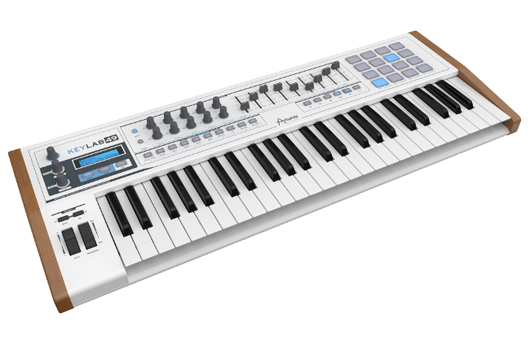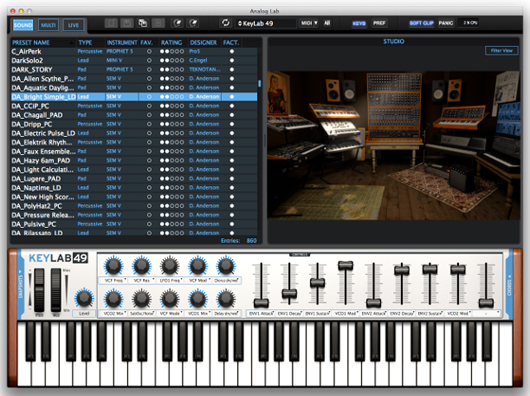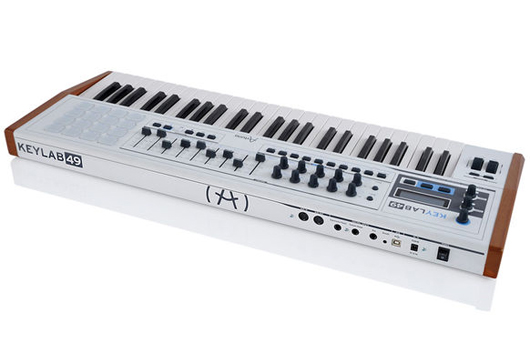Review: Arturia KeyLab
While French company Arturia is maybe best known for its Analog Classic VSTs (faithful recreations […]

While French company Arturia is maybe best known for its Analog Classic VSTs (faithful recreations of vintage synthesizers that are often heralded as sounding like near clones of their original versions), it nonetheless turned heads when it jumped into the world of analog instruments with the small-but-substantial MiniBrute and the even more compact MicroBrute. But the brand has not forsaken those who prefer the flexibility and ease of use that virtual instruments bring, having recently unveiled its KeyLab series. Arturia’s feature-packed MIDI controllers come bundled with the Analog Lab software—which includes 5,000 sounds from its various instrument emulations—and offer 25-, 49-, and 61-key versions of the product. It’s an expanded take on the smaller, more portable Minilab, and a new contender in a crowded field of MIDI controllers seeking to break down the barriers between software sound design and tactile control.
How It Looks
Unboxing the KeyLab 49 (the model we used for this review) immediately hints at Arturia’s goals—the controller is fairly heavy, solidly built, and elegantly designed. The real wood sides add a warm touch that most plastic keyboards can’t compete with, while the buttons, sliders, and knobs all feel substantial and sturdy. The same can be said for the keys themselves, which boast velocity sensitivity, aftertouch, and the right combination of weight and quick response. The 32-digit LCD screen is bright and easy to read from all angles, while the 16 pads on the side are perfectly suitable for MPC-style finger drumming, and can be easily programmed to play chords.
How It Works
The KeyLab 49 can be used simply as a standalone controller for any DAW, and in this context, it excels. The array of controls on its surface—one modulation wheel, one pitch bend wheel, two banks of 10 encoders, nine faders, one volume knob, and 10 assignable switches—give users enough options to map an assortment of sound-editing functions, and setting up custom MIDI maps is expedited by Arturia’s MIDI Control Center, a handy piece of included software that allows users to quickly edit and save their parameters.
However, most users are likely to use the KeyLab with its bundled Analog Lab software, which can run as a standalone program for live use or as a plugin with any DAW. The included presets—which are categorized by genre, instrument, sound, or designer—can be used in either single mode or multi-mode, an option which layers multiple sounds together and allows the user to split the keyboard accordingly. The only catch is that each preset has a limited number of parameters available to edit, unless the user has already purchased that particular Analog Classic synth emulation. While this was initially frustrating, Arturia has done a nice job of selecting the most important parameters for each patch, ultimately helping save time and make choosing and customizing sounds a more streamlined process.
Analog Lab

How It Sounds
There is a reason that Arturia is one of the most heralded designers of software synths, and proof for that praise is readily available in the exceptional sounds that come bundled with the KeyLab. Spanning such synth emulations as the Roland Jupiter 8, Sequential Circuits Prophet 5, Oberheim SEM, and Moog’s MiniMoog, the 5,000 included sounds exhibit a depth and richness that make it very easy to forget they’re being digitally generated and not running through a slew of vintage electronics. Many of the presets sound ready-to-go without adjusting any of the potential parameter controls, which is not something that can be said for all software synths. A minor quibble is that a number of the included effects are fairly generic with minimal controls. Most users will likely run the Analog Lab through their own VSTs and DAW effects, thus making the included delays and compressors somewhat superfluous—not to mention time consuming to individually turn off.

The Bottom Line
Arturia has produced a sturdy, easy-to-use controller for its KeyLab series, one that will meet the needs of many users straight out of the box. Its substantial weight and highly playable keyboard, along with a bevy of tactile controls, makes it feel like a real instrument and immediately inspire confidence. When coupled with the diverse range of Analog Lab presets, the KeyLab is a great introduction into the land of VST instruments. However, those with experience programming real synthesizers might be inclined to purchase the full Analog Classic emulations; getting just a taste of each instrument without being able to tweak every parameter can be a bit unsatisfying. This limitation becomes a much more contentious point when considering the KeyLab’s hefty price tags (from $299 up to $499), as there are quite a few capable MIDI controllers with similar feature sets that sell for much less. Committed users of Arturia’s pristine Analog Classic instruments will find a lot to love in the KeyLab controllers, but producers with no such allegiance would be wise to take a second look and decide whether or not they want to commit to a relatively costly controller.
MSRP: $299 (25), $399 (49), $499 (61)

